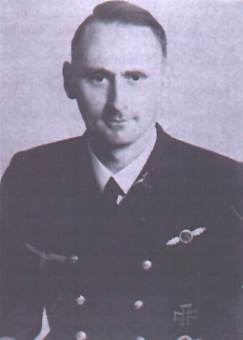Soldier to the Last Minute
Grossadmiral Karl Dönitz and the Nuremberg Trial
2. Last Man Standing
Early in 1945 Großadmiral Dönitz clearly saw that nothing could save the Reich and that it's ongoing agony as well as the continued killing should be terminated as soon as possible. After Hitler's death, which was - with the Soviets closing in on Berlin - imminent - he planned to surrender all of his naval forces to the British or the Americans. At the same time he wanted to seek death in one final engagement to ensure that no one could accuse him of personal cowardice.
It was in this situation that on 30th April 1945 he received a radio message from the private secretary of the Führer, Bormann, which appointed him, Dönitz, as Hitler's successor, head of state and supreme commander of all German armed forces. Dönitz was well aware of the fact that if he accepted this political office not only would that leave a shadow on his stainless military career, but that he could not escape the prospective humiliation by committing suicide. He would have to stand and fight on until - with as many people as possible saved from the Soviets - he could finally surrender and put an end to the worst war in the history of mankind. He also knew that he was the only high ranking official German person available that the Allies would accept in talks about an armistice or a surrender as he was by no means involved in the political entanglements of the Third Reich. Although the appointment of him as 'Reichspräsident' was at least questionable from a constitutional point of view - the Weimar Constitution of the Reich was still effective - he had to accept it, as the required legitimization of the head of state by a general election was impossible to carry out. Some people might have been puzzled, why Großadmiral Dönitz was appointed by Hitler and not some other Nazi. Well, the answer might well be that Hitler saw in one last moment of clear thought, that Germany did not need a Nazi criminal but somebody decent who could - with firmness of character and an unstained personality - help the devastated country. Someone had to take over the responsibility and care for the German state and people. This the Großadmiral did in the finest traditions of the German officer corps, holding the needs of the many higher than considerations of personal honor or welfare.
So a provisional government was formed which was to be responsible for all German affairs until a democratic general election could be held. Dönitz carefully avoided the involvement of Nazi scoundrels in his government, so he personally had to deny the still powerful Reichsführer SS Himmler a post in the new 'Reichsregierung'. During that talk, Dönitz always had a loaded gun for self defence ready at hand, hidden under piles of paper on his office desk.
Immediately after taking over government functions in the beginning of May, Dönitz sent out General-Admiral von Friedeburg, the Commanding Admiral of the U-boats, as his personal envoy to the headquarters of Field Marshal Montgomery and General Eisenhower. He should achieve the possibility of succeeding part surrendering of the German forces facing the Allied armies because the rescue operations in the Baltic were still going on. The British Field Marshal Montgomery understood the needs of the Germans, while the American General Eisenhower insisted on a complete surrender of the Germans on all fronts, including the Eastern front. Although Eisenhower's position was a drawback, von Friedeburg succeeded in achieving a part surrender of the German Forces facing Montgomery's troops, which was put into effect on the 4th May 1945. In the meantime, with the agreement of Field Marshal Montgomery, German destroyers and E-boats left port in a final rescue attempt which resulted in the successful evacuation of 43,000 people from the Hela peninsula.
After prolonged negotiations, on 7th May the document about the complete surrender of all German forces was signed at General Eisenhower's headquarters in Reims (repeated at the Soviet Army headquarters at Berlin-Karlshorst on 8th May), which was effective at 00.01 hours, 9th May 1945. The Second World War in Europe was finally over.
In his last order to his U-boats, issued on the same day, Dönitz thanked his men for their unbroken loyalty and asked them to preserve themselves now for the best of the Fatherland. Then he ordered his U-boats to surface and head for British or American ports to surrender.
The unconditional surrender of the Wehrmacht legally had no effect on Dönitz' government, which was still residing at the Navy Academy at Flensburg-Mürwik, tolerated by the Western powers. There plans were drafted by the various secretaries to ensure the avoidance of a hunger catastrophe and the rebuilding of the country. Dönitz had always considered his main task to be that of putting an end to the war. Now that this had been accomplished, he was basically without a job and he wanted to step down from office. But as 'Reichspräsident' he was a symbol of the unity and the sovereignty of the German state and so he convinced himself that he should stay. When rumors reached him about some terrible discoveries in the concentration camps he ordered an immediate investigation of the case by German law courts, but that was not meant to happen. Knowing that the Allies would acquiesce an all German government not installed by them only as long as they needed it for carrying out the conditions of the surrender, he nevertheless did his duty, stayed and waited patiently for the inevitable.

Members of the last German government after arresting by British forces
(From left Reichsminister Speer, Großadmiral Dönitz and Generaloberst Jodl)
On May 23, 1945 the last German 'Reichsregierung' was arrested by British forces under such abasing conditions, that even the British Prime Minister Churchill was very upset about the circumstances of the arrest.



